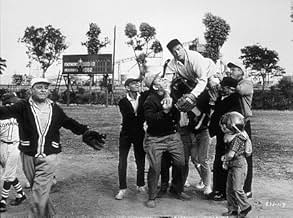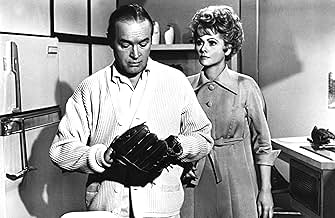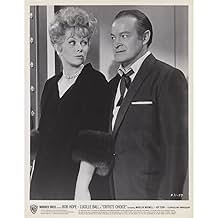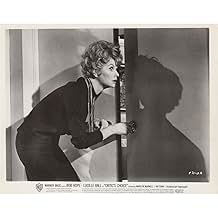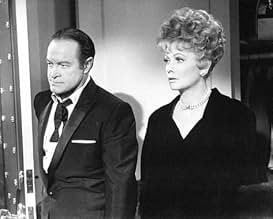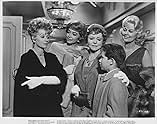IMDb RATING
5.7/10
1.2K
YOUR RATING
Parker Ballantine is a New York theater critic and his wife writes a play that may or may not be very good. Now Parker must either get out of reviewing the play or cause the breakup of his m... Read allParker Ballantine is a New York theater critic and his wife writes a play that may or may not be very good. Now Parker must either get out of reviewing the play or cause the breakup of his marriage.Parker Ballantine is a New York theater critic and his wife writes a play that may or may not be very good. Now Parker must either get out of reviewing the play or cause the breakup of his marriage.
Rickey Kelman
- John Ballantine
- (as Ricky Kelman)
Joseph Gallison
- Philip 'Phil' Yardley
- (as Evan McCord)
- Director
- Writers
- All cast & crew
- Production, box office & more at IMDbPro
Featured reviews
Parker Ballentine (Bob Hope) is a famous and acerbic theater critic. When his wife, Angela (Lucille Ball), decides to write a play, Parker is not in the least bit enthusiastic nor supportive. When she finishes, she asks him to read it and give her his honest opinion. He does and tells her he hates it. So imagine his surprise when a famous producer decides to put on her play!! In a definite conflict of interest, Parker agrees to see her play and review it....and marital fireworks result.
Like one of Hope and Ball's previous films, "The Facts of Life", "Critic's Choice" isn't exactly a comedy. While Hope spouts a variety of one-liners instead of real dialog (something I really dislike after a while), the emphasis is not on comedy but is more like a drama. This isn't a complaint...more an observation. And, it's interesting that Hope's character is rather petulant...a real departure for him.
Although the film apparently was a box office failure, I actually thought it was pretty good. But as I mentioned above, it wasn't a comedy and Hope played a guy who was a bit of a jerk....and that likely turned audience members off to the film back in 1963. An interesting departure for Hope...and a film that is worth your time.
Like one of Hope and Ball's previous films, "The Facts of Life", "Critic's Choice" isn't exactly a comedy. While Hope spouts a variety of one-liners instead of real dialog (something I really dislike after a while), the emphasis is not on comedy but is more like a drama. This isn't a complaint...more an observation. And, it's interesting that Hope's character is rather petulant...a real departure for him.
Although the film apparently was a box office failure, I actually thought it was pretty good. But as I mentioned above, it wasn't a comedy and Hope played a guy who was a bit of a jerk....and that likely turned audience members off to the film back in 1963. An interesting departure for Hope...and a film that is worth your time.
If you want to see Lucy at her least funny, watch this. She looks like she has a lot of personal strain, or something. Lucy never clicked in the movies for some reason, but on TV she soared. Bob Hope also struggles with the lame screenplay. You'll recognize many of the faces here, like Jim Backus and Rip Torn, among others. Apparently the play that this is based on got good reviews, but this movie version is so bad I'm surprised they didn't stop production and revamp it. On an up note, the movie is an indispensable time capsule. With JFK's assassination and the Beatles, this early 60's world would soon change forever. It's also worth seeing for the tiny Soupy Sales cameo.
When you watch a film that starred two legends of comedy (Lucille Ball and Bob Hope) you expect to find a very funny movie. And, yes, "Critic's Choice" has some amusing parts to it. As a comedy, it's more "Bob Hope" style than "Lucille Ball" style. The humour is more subtle and ironic (more like Hope) than the kind of slapstick physical comedy that Ball was known for - although it does include some physical comedy, surprisingly given to Hope in the last half hour or so. But to call this movie a "comedy" I think is to miss the point. I saw it as more of a drama, even more a psychological study of Hope's character. He played Parker Ballantine, a fierce Broadway critic for a New York newspaper, while Ball plays his wife Angie, who gets it into her head to write a play about her early life with her mother and three sisters.
If I were to rate this as a comedy, I'd probably say that it fell flat - but I was actually quite taken with the story and the character of Parker. He was an unpleasant character. Yes, Hope played him with some comedy - but he wasn't a nice man. Once Angie decided to write her play (very early in the movie) Parker wouldn't let his critic's voice go. He discouraged her, he belittled her, he made fun of her - and most of it, while couched as a comedy, was actually rather mean and not funny. When the movie opened, Parker was writing a scathing review of a play that starred his ex-wife (who was played by Marilyn Maxwell.) That goes almost immediately into his acerbic attitude toward Angie's play. The point gets made in the movie that maybe Parker has a problem - he disses everything that the women who are close to him try to do, almost as if he's trying to sabotage them and their careers; as if he doesn't want a "successful" woman in his life. And, although there's an attempt to redeem him slightly at the end, Parker's most obnoxious scenes come late in the movie at the theatre, the night Angie's play opens in New York. Having withdrawn from reviewing the play, he shows up anyway - drunk and, frankly, obnoxious (I'm not sure why he wouldn't have been kicked out of the theatre, or even why he was allowed in in the first place) - tries to kick his paper's reviewer out and when he can't do that goes up to the balcony and causes quite a scene (this is where Hope's physical comedy comes in.) He then proceeds to write a review of the play anyway and his review is blistering, as he writes that the play "was written by Angela Ballantine, directed by Dion Kapakos, and produced by mistake." (I must admit that I wondered why his paper would allow a drunken reviewer - even a big name one - to write a review of a play written by his own wife to which someone else had been assigned as the reviewer, but maybe that's thinking too much about this.)
This was not what I was expecting. I was expecting a light comedy - instead I got more of a drama about a couple with some really serious issues in their marriage. And while I wouldn't rate it that highly as a comedy, I thought that if you look at it as a marital drama it's actually pretty good. For me, the most powerful scene in the movie didn't even involve Ball - it was the very dramatic and even acerbic confrontation between Parker and his son John (played by Ricky Kelman) - who seems to have irritated a few reviewers, but who I thought was actually pretty good, playing a kid who had obviously been raised in a somewhat strange environment. The scene was set at home on opening night, before Parker's drinking binge. That confrontation aside, John's relationship with his mother (Maxwell) was especially weird - she seems to have been largely uninterested in him, and he calls her not "Mom" but "Ivy."
There's a decent supporting cast - most of whose names (Rip Torn, Jim Backus, Richard Deacon and even Soupy Sales) add to the expectation that you're going to be watching a funny movie. But I would suggest not watching this to get a good laugh, even if that is your initial expectation. Watch it as more of a character study of Parker. It works much better that way. (7/10)
If I were to rate this as a comedy, I'd probably say that it fell flat - but I was actually quite taken with the story and the character of Parker. He was an unpleasant character. Yes, Hope played him with some comedy - but he wasn't a nice man. Once Angie decided to write her play (very early in the movie) Parker wouldn't let his critic's voice go. He discouraged her, he belittled her, he made fun of her - and most of it, while couched as a comedy, was actually rather mean and not funny. When the movie opened, Parker was writing a scathing review of a play that starred his ex-wife (who was played by Marilyn Maxwell.) That goes almost immediately into his acerbic attitude toward Angie's play. The point gets made in the movie that maybe Parker has a problem - he disses everything that the women who are close to him try to do, almost as if he's trying to sabotage them and their careers; as if he doesn't want a "successful" woman in his life. And, although there's an attempt to redeem him slightly at the end, Parker's most obnoxious scenes come late in the movie at the theatre, the night Angie's play opens in New York. Having withdrawn from reviewing the play, he shows up anyway - drunk and, frankly, obnoxious (I'm not sure why he wouldn't have been kicked out of the theatre, or even why he was allowed in in the first place) - tries to kick his paper's reviewer out and when he can't do that goes up to the balcony and causes quite a scene (this is where Hope's physical comedy comes in.) He then proceeds to write a review of the play anyway and his review is blistering, as he writes that the play "was written by Angela Ballantine, directed by Dion Kapakos, and produced by mistake." (I must admit that I wondered why his paper would allow a drunken reviewer - even a big name one - to write a review of a play written by his own wife to which someone else had been assigned as the reviewer, but maybe that's thinking too much about this.)
This was not what I was expecting. I was expecting a light comedy - instead I got more of a drama about a couple with some really serious issues in their marriage. And while I wouldn't rate it that highly as a comedy, I thought that if you look at it as a marital drama it's actually pretty good. For me, the most powerful scene in the movie didn't even involve Ball - it was the very dramatic and even acerbic confrontation between Parker and his son John (played by Ricky Kelman) - who seems to have irritated a few reviewers, but who I thought was actually pretty good, playing a kid who had obviously been raised in a somewhat strange environment. The scene was set at home on opening night, before Parker's drinking binge. That confrontation aside, John's relationship with his mother (Maxwell) was especially weird - she seems to have been largely uninterested in him, and he calls her not "Mom" but "Ivy."
There's a decent supporting cast - most of whose names (Rip Torn, Jim Backus, Richard Deacon and even Soupy Sales) add to the expectation that you're going to be watching a funny movie. But I would suggest not watching this to get a good laugh, even if that is your initial expectation. Watch it as more of a character study of Parker. It works much better that way. (7/10)
I will assume that Ira Levin's original Broadway play was much better than this dull, tedious film. It has obviously been altered to fit the acting styles of Ball and Hope. Lucy's role comes across as a toned-down version of her Lucy-wants-to get-in-show-business character, and Hope hams it up as the husband. Scene after scene comes across as rather pedestrian. The sets and cinematography are fine, and Edith Head provides Lucy with great costumes. Perhaps fans of the then-running "Lucy Show" made this film a success. However, 1968's "Yours, Mine and Ours" is a much better vehicle for Ball, even if her advanced age made that role unrealistic. In retrospect, Lucy comes across as annoying and passive in this film. In addition, the child actor Ricky Kelman is extremely irritating as the son of Hope, and step-son of Ball.
Mention the name Lucille Ball, and what comes to mind for most of us is the zany character in the long-running 1950s TV comedy show, "I Love Lucy." But, I wonder if Lucy started out with a wish to be a comedienne, or if she had her eyes on any other fields of stage or screen. Comedy was part of her early roles, but she also had roles in which she sang and danced ("Dance, Girl, Dance" of 1940). And there can be no doubt about her acting ability from such dramatic and suspense films as "Valley of the Sun" and "The Big Street" in 1942; or "The Dark Corner" in 1946; or "Lured" in 1947.
On the other hand, there's little doubt about Bob Hope's aspirations. From his earliest days in vaudeville, Hope was a comedian, and he would always be a comedian. For all his kidding aside about earning as Oscar, Bob knew that he had little chance because Oscar very rarely went to a comedian. He even made his overt desire for an Oscar a part of his long- running comedy routines, and it was sure to get a laugh decade after decade
That doesn't mean that Bob Hope didn't do some very funny movies. But his type of humor wasn't the subtle, clever or zany type that usually involved great or very good acting. Clark Gable, James Stewart, Carole Lombard and Claudette Colbert were some of the very accomplished dramatic actors who could do Oscar-winning caliber comedy in movies. Bob's comedy forte was the one-liner. Or, make that, a string of one- liners, one after the other. And in that, he often aroused some great laughter.
So, that brings us to this movie, "Critic's Choice." This film is meant to be a semi-serious movie about Broadway and a critic's life, with a comedic outlook. And Lucy plays a serious character, a "straight man" to Bob's wisecracks and one-liners. I think it was intended as a light comedy to begin with, sans any zaniness on Lucy's part. The very funny parts are in the last half with Bob. He has some zany scenes himself, and a few strings of one-liners that bring out loud laughter. Some examples are: "This is the drunkenest room I've ever been in." "This apartment's all uphill." And, "I'd just like to be there when we get where I'm going."
"Critic's Choice" is a nice film for an evening of light entertainment, and worth watching just to see two of the great comics of all time together.
On the other hand, there's little doubt about Bob Hope's aspirations. From his earliest days in vaudeville, Hope was a comedian, and he would always be a comedian. For all his kidding aside about earning as Oscar, Bob knew that he had little chance because Oscar very rarely went to a comedian. He even made his overt desire for an Oscar a part of his long- running comedy routines, and it was sure to get a laugh decade after decade
That doesn't mean that Bob Hope didn't do some very funny movies. But his type of humor wasn't the subtle, clever or zany type that usually involved great or very good acting. Clark Gable, James Stewart, Carole Lombard and Claudette Colbert were some of the very accomplished dramatic actors who could do Oscar-winning caliber comedy in movies. Bob's comedy forte was the one-liner. Or, make that, a string of one- liners, one after the other. And in that, he often aroused some great laughter.
So, that brings us to this movie, "Critic's Choice." This film is meant to be a semi-serious movie about Broadway and a critic's life, with a comedic outlook. And Lucy plays a serious character, a "straight man" to Bob's wisecracks and one-liners. I think it was intended as a light comedy to begin with, sans any zaniness on Lucy's part. The very funny parts are in the last half with Bob. He has some zany scenes himself, and a few strings of one-liners that bring out loud laughter. Some examples are: "This is the drunkenest room I've ever been in." "This apartment's all uphill." And, "I'd just like to be there when we get where I'm going."
"Critic's Choice" is a nice film for an evening of light entertainment, and worth watching just to see two of the great comics of all time together.
Did you know
- TriviaLast of four feature films that Bob Hope and Lucille Ball made together. The other three pictures were Propre à rien! (1950), Un crack qui craque (1949), and Voulez-vous pêcher avec moi? (1960).
- GoofsThe movie takes place in New York, but during the softball game, the famed Los Angeles Gas Works tank is clearly visible in the background.
- Quotes
John Ballantine: For the record, Sisters Three was written by Angela Ballantine, directed by Dion Kapakos, and produced by mistake.
- Crazy creditsEnding: "The absolute End"
- ConnectionsReferenced in What's My Line?: Bob Hope and Lucille Ball (1963)
- How long is Critic's Choice?Powered by Alexa
Details
- Release date
- Country of origin
- Language
- Also known as
- Cuando el corazón manda
- Filming locations
- William Mead Homes, 1300 Cardinal Street, Los Angeles, California, USA(Apartments/baseball field)
- Production company
- See more company credits at IMDbPro
- Runtime
- 1h 40m(100 min)
- Aspect ratio
- 2.35 : 1
Contribute to this page
Suggest an edit or add missing content


